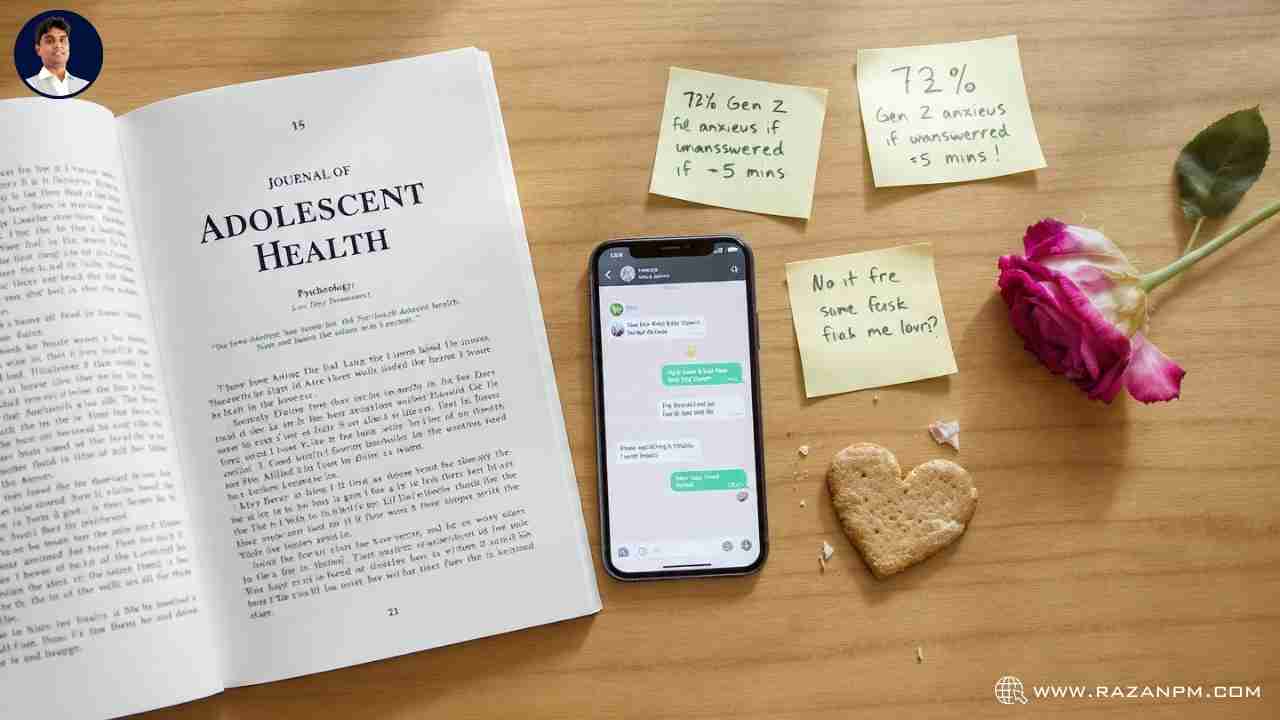It’s just been 10 minutes, but your mind already started its overthinking parade—
“Did I say something wrong?” “Are they ignoring me?” “Maybe they’ve lost interest…”
Funny thing? It’s not even a breakup. It’s just a ‘delivered’ without a reply.
This is what I often call the ‘modern heartbreak symptom’—one where a blue tick hurts more than silence, and where texting anxiety is replacing face-to-face connection.
As a Govt.Recognized Counsellor & Mind Healer, I see this every week — bright, ambitious young people struggling with loneliness and emotional burnout, all because of something as “simple” as texting.
also read: the real psychology behind left onread anxiety

We live in a time where connection is instant, yet real intimacy feels out of reach.
Texting gives us control — we can type, delete, rewrite, and send when we’re “ready.” But that control also creates distance.
Gen Z often tells me,
“I can share everything online, but in real life, I freeze.”
The problem?
Digital love feels safe but empty.
It gives validation without vulnerability, attention without emotional depth.
Slowly, we’re raising a generation that confuses typing speed with emotional closeness and ‘good morning texts’ with genuine love.
also read: how disorders like insomnia fueldepression?
When I talk to young clients, their feelings sound heartbreakingly similar:
Can you relate?
You’re not alone. This is emotional fatigue — the silent side effect of texting culture.
We’ve replaced real conversation with “LOL,” deep affection with a “❤️ emoji,” and honest talks with “ghosting.”
In Hindi — “Ab pyaar ka expression sirf typing box tak simit reh gaya hai.”
also read: how isolation triggers illness anddepression together?

Here’s what I often observe in my practice when texting turns toxic:
1. Overthinking Messages: Re-reading old chats for “hidden meanings.”
2. Anxiety After Delays: Feeling panicked when someone doesn’t reply.
3. Sleep Disturbance: Late-night texting leading to insomnia.
4. Social Withdrawal: Preferring chats over real interactions.
5. Validation Seeking: Feeling low without online attention.
6. Mood Swings: Getting emotionally affected by text tone or emojis.
These symptoms are not random — they’re reflections of deeper attachment anxiety, fear of rejection, and digital dependency.
From a clinical view, many of these patterns align with diagnostic understandings in DSM-5 and ICD-11:
In simple terms, the brain releases dopamine with every “ping” — a mini reward loop.
So, when replies stop coming, your brain feels withdrawal — the same neurochemical pathway seen in addiction cycles.
also read: how to stop the cycle of pain anddepression?

A 2022 study from the Journal of Social and Clinical Psychology found that people who spend more than 3 hours daily on texting and social apps report higher loneliness, anxiety, and lower emotional resilience.
Another Harvard Review revealed that Gen Z prefers texting because it allows emotional filtering — they can edit, avoid, and control vulnerability.
But the side effect?
They lose spontaneity and authentic emotional connection — two essential ingredients for healthy relationships.
In my own sessions, I’ve seen relationships crumble not because of cheating, but because of “emotional misinterpretation over text.”
A missing emoji can trigger insecurity, and silence can be mistaken for rejection.
also read: what to do when i love you gets noreply?
A 21-year-old client once told me,
“I broke up with him because he didn’t reply to my text for 4 hours.”
When I asked what actually happened, she said he was in class.
She cried, not because he ignored her, but because her mind created stories during the silence.
Together, we uncovered that her reaction wasn’t about him — it was about her fear of abandonment, rooted in earlier emotional neglect.
Through therapy, she learned to pause, breathe, and reflect before reacting.
Three months later, she shared,
“Now I don’t panic over blue ticks. I call. I talk. I feel heard again.”
That’s the shift — from reaction to real connection.
also read: how fear of rejection kills realconnection?

Here’s a simple but powerful exercise I often share with my Gen Z clients:
When you feel triggered by a delayed reply, take 3 deep breaths.
Remind yourself: “This silence doesn’t define my worth.”
Write your thoughts instead of sending them.
Ask: “What am I actually feeling — ignored, insecure, or unloved?”
This helps separate emotion from impulse.
Next time, call or send a voice note.
The tone, the laughter, the pauses — they heal misinterpretations faster than words on a screen.
Bonus: Practice a 1-hour no-phone rule daily to rewire your brain from instant-gratification loops.
also read: why timing turns simple talks intobig arguments?
Of course, this is just the beginning.
Healing digital love anxiety requires more than just tips — it needs guided emotional rewiring, mindful communication training, and sometimes trauma-informed therapy to break the “notification dependency” cycle.
Your mind deserves peace, not panic every time your phone buzzes.
Your heart deserves real love, not just “read receipts.”
also read: how everyday pressure breaks yourmind?
If this feels familiar — if you often catch yourself waiting, overthinking, or losing sleep over a text —
please know, you don’t have to figure it out alone.
As a Govt.Recognized Counsellor & Mind Healer, I help people every day rediscover calm, confidence, and genuine emotional connection in this digital chaos.
🌿 If you’re ready to feel lighter and more connected again,
Book your private 1:1 consultation here
let’s heal your mind and heart together.
Because real love still exists — it just needs to be felt, not typed. 💬❤️
👉 Begin Your Journey with a 1 on 1 Consultation
👉 Begin Your Journey with a 1 on 1 Consultation

Texting has made communication faster but emotionally distant. Gen Z often replaces deep talks with short texts or emojis, creating misunderstandings and less real connection.
also read: do voice notes kill realconversations?
Many Gen Z individuals feel safer behind screens. Texting gives control over words and emotions, reducing fear of rejection — but it also weakens emotional closeness.
also read: how bias turns into deep depression?
Yes. Over-texting triggers anxiety when replies delay or tone feels unclear. This overthinking cycle can lead to stress, sleep issues, and low self-esteem.
also read: how to tell if emotional separationhas already started?
Constant phone checking, feeling low without messages, re-reading chats for hidden meanings, and avoiding in-person talks are clear signs of texting addiction.
also read: why kind words create misunderstanding?
Start replacing some texts with voice or video calls. Practice mindful communication — listen, express feelings honestly, and take small “no-phone” breaks daily.
also read: how caregiving triggers hidden depression?
Yes. Studies show constant texting increases dopamine dependency, creating stress, anxiety, and fear of missing out — especially among Gen Z users.
also read: how fibromyalgia fuels hiddendepression?
Use the 3-Message Mind Reset — Pause before replying, journal your emotions, and prefer voice over text. This breaks overthinking loops effectively.
also read: why saying i love you is not enough?
If texting starts affecting sleep, concentration, or confidence, it’s time to seek guidance. A Counsellor can help rebuild emotional balance.
also read: why emotional intimacy feels unsafefor some partners?
